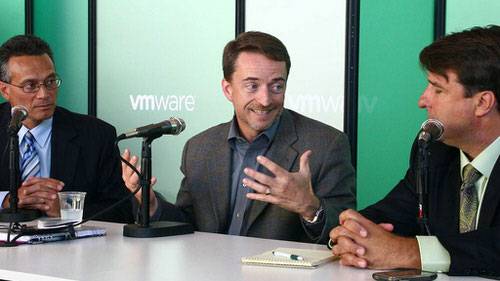
VMworld is rolling onward in San Francisco this week, a behemoth event that should be a great opportunity for VMware to fire up developers, partners and customers among the 20,000 attendees. But it seems to have spread some discord instead, with some partners worrying that VMware may be sidelining them in order to push its own technology at their expense.
Take, for instance, the announcement yesterday of the vCloud Hybrid Service, a new cloud service that VMware will provide directly to enterprise end users. The news met with more than a little ambivalence on the event floor. For one thing, VMware is not exactly well known as a cloud company. For another, though, there’s this little conundrum: If VMware is going to provide cloud services, where does that leave its resellers, distributors and other partners who are already, y’know, cloud service providers?
See also: VMware Takes On Amazon—Again—With New Hybrid Cloud Service
Not many VMware partners are using vCloud-based tools. NaviSite just launched a VMware-based cloud offering last week. CSC and Verizon Terremark are two other U.S. partners; Colt, SingTel and Softbank play similar roles with VMware globally. The company’s vCloud news yesterday could not have sat well with any of them.
The perception that VMware is no cloud provider may also hamstring the company. “VMware forgot the most important rule for a company,” one attendee told me yesterday. “Don’t put what you do in the company name.”
Its success in virtualization actually makes it much harder for VMware to venture out into new technology territories. That’s mostly a marketing and perception problem, but it’s still something to push through, based on comments I heard at the event.
The Partners Are Restless
VMware was making its partners ill at ease before VMworld even started. During his Monday keynote, CEO Pat Gelsinger had to walk back comments he made in an August 14 Network World interview that seemed to deride the open-source alternative OpenStack as an enterprise technology.
“We don’t see it having great success coming into the enterprise because it’s a framework for constructing clouds,” Gelsinger said in the interview. Given that a lot of VMware partners have a particularly strong interest in OpenStack—like, say, Dell, HP and Rackspace—those comments didn’t win VMware a lot of goodwill.
In his keynote, Gelsinger clarified that he saw OpenStack as a valid choice for customers to use in their cloud deployments, and that VMware would still work with the open source cloud project to include it within their software-defined data center strategy.
See also: With NSX, VMware Aims To Do To Networks What It Did To The Data Center
The fumbles with partners extend to VMware’s other big announcement from the show. The network virtualization technology known as NSX could be a big deal for VMware moving forward, but as CRN reports, partners weren’t exactly feeling clued in.
VMware’s channel moves are reminiscent of the way Twitter began treating third-party applications back in the spring of 2012, when the social media company started restricting its APIs and shutting down acquired tools in order to start looking after its bottom line.
See also: Twitter Kills Off Tweetdeck – R.I.P. Third-Party Clients
VMware seems to be looking out for itself these days in much the same way—though it’s interesting that a vast majority of its revenue is driven by the same channel partners it’s cold-shouldering. This could be a sign that VMware, despite having strong results for Q2 2013, is preparing for some rough times ahead. Possibly because so many partners and vendors are already looking at alternatives to VMware-based services.
VMware’s very reaction, ironically, might start making that search for alternatives even more urgent.
Image courtesy Ricky McGill SiliconANGLE PHOTO

















